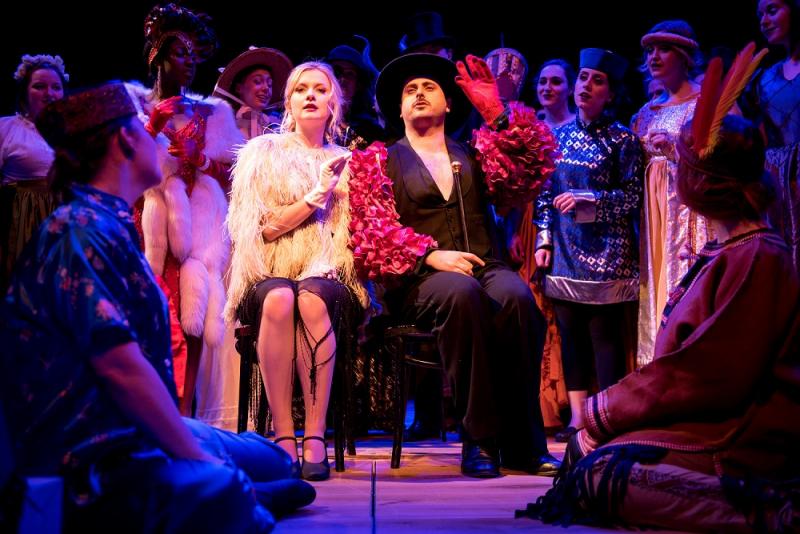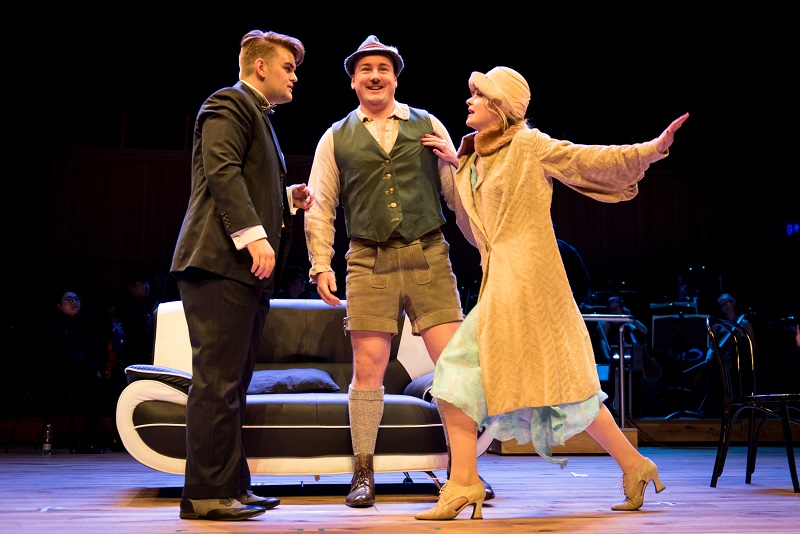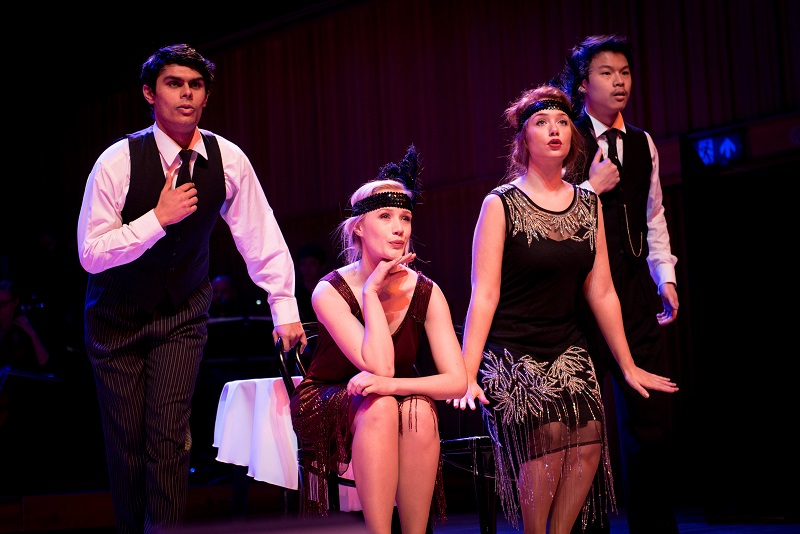La Vie Parisienne, Royal Birmingham Conservatoire review - vintage champagne in a new bottle | reviews, news & interviews
La Vie Parisienne, Royal Birmingham Conservatoire review - vintage champagne in a new bottle
La Vie Parisienne, Royal Birmingham Conservatoire review - vintage champagne in a new bottle
A celebratory production adds up to more than the sum of its parts

Don’t you just love that new concert hall smell?
It’s not the usual procedure. The RBC’s vocal department usually hires the pocket-sized Crescent Theatre in Brindleyplace which – although it struggles to accommodate a full orchestra – at least has the basic equipment of a theatre. With the orchestra at the back of the platform and drapes forming an ad hoc proscenium, there was a sense throughout this energetic and frequently very funny production that it was straining at the limits of what was possible with this minimal set-up – full costumes, but no scenery beyond a couple of tables and a sofa.
That’s not meant as a criticism of Michael Barry’s production. If anything, it’s a reflection of the energy and inventiveness with which he marshalled his chorus scenes and choreographed each number – no song without a dance here – and the sheer brio with which his student cast went at it. You don’t expect superpowered singing from a student production, but the spoken dialogue (every bit as crucial in operetta) can trip up even professional companies. Barry uses a droll English translation by Clive Timms and Martin Lloyd-Evans, and for every groan-inducing pun (“If she was a Swede, that’d be a turnip for the books”) there was a little touch of wit that gave the performers something to run with. One of the joys of the show was how fully they inhabited their personas, whether James Gribble’s strutting bantam of a Bobinet, Hélène Ducos’s feline Métella, or Joe Clayton’s drooping dignity as the head waiter. I’ve still no idea why Barry transformed the shoemaker Frick into a lederhosen-wearing comedy German, but Dominic Lee (pictured above, with Jack Dolan as Gardefeu) carried it off with lugubrious good humour.
It looked colourful, too. There wasn’t much visual scope to evoke the City of Light, so Jennet Marshall’s costume designs sketched the general atmosphere, updating Offenbach’s Second Empire to a comparably louche 1920s complete with flapper dresses, pencil moustaches and pinafore clad schoolgirls (plus attendant nuns) straight out of Ludwig Bemelmans’s Madeline. But of course it’s the music that really supplies the fizz, and La Vie Parisienne is premiere cuvée Offenbach, bubbling pure from the source (there’s a reason why they called him the Mozart of the Champs-Elysées). To his credit the conductor, Michael Seal, knew better than to handle it like Sèvres porcelain, and while the big choruses bustled along exuberantly, and the violins had a seductive way of caressing a melodic line, he was ready to deliver a brisk rhythmic kick when necessary – while piccolo and bassoon got their due share of the comic action. 
The singers seemed empowered by such close support: predominantly undergraduates (or so I understand), it’s perhaps unsurprising that many of the voices were somewhat underweight. (English translation or no, the absence of surtitles in the sung numbers was a serious problem). But that doesn’t necessarily stand in the way of a persuasive performance, and Jack Dolan’s big, brisk and engagingly raffish Gardefeu had a lively comic rapport with both Gribble and Andrew Randall’s delightfully dry stick of a Swedish baron. Occasionally a voice seemed under-utilised – I’d like to have heard more of Andrew Armstrong’s handsome baritone as the manservant Prosper (pictured above left), and Elouise Waterhouse made the haughty best of the underwritten role of the Baroness.
Ducos found a properly steely diva snarl as Métella showed her claws; and she had a rather stylish way of draping melody over an accompaniment. But it was Elise Fairley as the glovemaker-on-the make Gabrielle who ran away with the show – as Gabrielle so often does. This was a voice with a genuine soubrette sparkle, carried with smiling assurance: social-climbing has never looked so much fun. And if it’s to be hoped that the RBC’s operas are back in a proper theatre next time around, it doesn’t detract from the fact that – as a one off celebration – this Vie Parisienne is nothing if not a lot of fun.
rating
Explore topics
Share this article
The future of Arts Journalism
You can stop theartsdesk.com closing!
We urgently need financing to survive. Our fundraising drive has thus far raised £49,000 but we need to reach £100,000 or we will be forced to close. Please contribute here: https://gofund.me/c3f6033d
And if you can forward this information to anyone who might assist, we’d be grateful.

Subscribe to theartsdesk.com
Thank you for continuing to read our work on theartsdesk.com. For unlimited access to every article in its entirety, including our archive of more than 15,000 pieces, we're asking for £5 per month or £40 per year. We feel it's a very good deal, and hope you do too.
To take a subscription now simply click here.
And if you're looking for that extra gift for a friend or family member, why not treat them to a theartsdesk.com gift subscription?
more Opera
 Tosca, Welsh National Opera review - a great company reduced to brilliance
The old warhorse made special by the basics
Tosca, Welsh National Opera review - a great company reduced to brilliance
The old warhorse made special by the basics
 BBC Proms: The Marriage of Figaro, Glyndebourne Festival review - merriment and menace
Strong Proms transfer for a robust and affecting show
BBC Proms: The Marriage of Figaro, Glyndebourne Festival review - merriment and menace
Strong Proms transfer for a robust and affecting show
 BBC Proms: Suor Angelica, LSO, Pappano review - earthly passion, heavenly grief
A Sister to remember blesses Puccini's convent tragedy
BBC Proms: Suor Angelica, LSO, Pappano review - earthly passion, heavenly grief
A Sister to remember blesses Puccini's convent tragedy
 Orpheus and Eurydice, Opera Queensland/SCO, Edinburgh International Festival 2025 review - dazzling, but distracting
Eye-popping acrobatics don’t always assist in Gluck’s quest for operatic truth
Orpheus and Eurydice, Opera Queensland/SCO, Edinburgh International Festival 2025 review - dazzling, but distracting
Eye-popping acrobatics don’t always assist in Gluck’s quest for operatic truth
 MARS, Irish National Opera review - silly space oddity with fun stretches
Cast, orchestra and production give Jennifer Walshe’s bold collage their all
MARS, Irish National Opera review - silly space oddity with fun stretches
Cast, orchestra and production give Jennifer Walshe’s bold collage their all
 Káťa Kabanová, Glyndebourne review - emotional concentration in a salle modulable
Janáček superbly done through or in spite of the symbolism
Káťa Kabanová, Glyndebourne review - emotional concentration in a salle modulable
Janáček superbly done through or in spite of the symbolism
 Buxton International Festival 2025 review - a lavish offering of smaller-scale work
Allison Cook stands out in a fascinating integrated double bill of Bernstein and Poulenc
Buxton International Festival 2025 review - a lavish offering of smaller-scale work
Allison Cook stands out in a fascinating integrated double bill of Bernstein and Poulenc
 Tosca, Clonter Opera review - beauty and integrity in miniature
Happy surprises and a convincing interpretation of Puccini for today
Tosca, Clonter Opera review - beauty and integrity in miniature
Happy surprises and a convincing interpretation of Puccini for today
 Hamlet, Buxton International Festival review - how to re-imagine re-imagined Shakespeare
Music comes first in very 19th century, very Romantic, very French operatic creation
Hamlet, Buxton International Festival review - how to re-imagine re-imagined Shakespeare
Music comes first in very 19th century, very Romantic, very French operatic creation
 Falstaff, Glyndebourne review - knockabout and nostalgia in postwar Windsor
A fat knight to remember, and snappy stagecraft, overcome some tedious waits
Falstaff, Glyndebourne review - knockabout and nostalgia in postwar Windsor
A fat knight to remember, and snappy stagecraft, overcome some tedious waits
 Salome, LSO, Pappano, Barbican review - a partnership in a million
Asmik Grigorian is vocal perfection in league with a great conductor and orchestra
Salome, LSO, Pappano, Barbican review - a partnership in a million
Asmik Grigorian is vocal perfection in league with a great conductor and orchestra
 Semele, Royal Opera review - unholy smoke
Style comes and goes in a justifiably dark treatment of Handelian myth
Semele, Royal Opera review - unholy smoke
Style comes and goes in a justifiably dark treatment of Handelian myth

Add comment